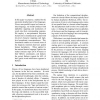Free Online Productivity Tools
i2Speak
i2Symbol
i2OCR
iTex2Img
iWeb2Print
iWeb2Shot
i2Type
iPdf2Split
iPdf2Merge
i2Bopomofo
i2Arabic
i2Style
i2Image
i2PDF
iLatex2Rtf
Sci2ools
ACL
2010
2010
A Statistical Model for Lost Language Decipherment
In this paper we propose a method for the automatic decipherment of lost languages. Given a non-parallel corpus in a known related language, our model produces both alphabetic mappings and translations of words into their corresponding cognates. We employ a non-parametric Bayesian framework to simultaneously capture both low-level character mappings and highlevel morphemic correspondences. This formulation enables us to encode some of the linguistic intuitions that have guided human decipherers. When applied to the ancient Semitic language Ugaritic, the model correctly maps 29 of 30 letters to their Hebrew counterparts, and deduces the correct Hebrew cognate for 60% of the Ugaritic words which have cognates in Hebrew.
ACL 2010 | Computational Linguistics | Correct Hebrew Cognate | Low-level Character Mappings | Non-parametric Bayesian Framework |
| Added | 10 Feb 2011 |
| Updated | 10 Feb 2011 |
| Type | Journal |
| Year | 2010 |
| Where | ACL |
| Authors | Benjamin Snyder, Regina Barzilay, Kevin Knight |
Comments (0)

